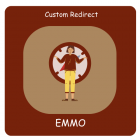How to Use PHP 8.3's #[Override] Attribute for Safer Magento Development
![How to Use PHP 8.3's #[Override] Attribute for Safer Magento Development](https://emmo.net.co/media/emmo_articles/freepik__the-style-is-candid-image-photography-with-natural__9942.jpeg)
How to Use PHP 8.3's #[Override] Attribute for Safer Magento Development
The #[Override] attribute in PHP 8.3 helps Magento developers write safer, more reliable code by ensuring overridden methods in child classes actually exist in the parent. If a method name changes or is removed upstream, PHP will throw a clear error instead of silently failing—protecting your customizations from breaking during upgrades or refactors. In this guide, you’ll learn how to use the #[Override] attribute in real Magento scenarios, understand its benefits, and avoid hidden bugs in your module development.
How to Use PHP 8.3's #[Override] Attribute for Safer Magento Development
PHP 8.3 introduced a new attribute, #[Override], that can make Magento development safer and more reliable. If you’ve ever struggled with Magento upgrades breaking your custom code, or methods silently failing after updates, this small feature will help. Magento developers already use PHP attributes like #[ReturnTypeWillChange] and #[DataFixture], often without realizing it. Now, #[Override] gives us a safety net against hidden bugs during class customizations.
We missed adopting strict method overrides in the past, but it's time to fix that. Here's how #[Override] works and why you should start using it.
What Is the #[Override] Attribute?
The #[Override] attribute tells PHP that a method is meant to override a parent method. If no matching parent method exists, PHP throws a fatal error. No more silent failures. No more broken functionality hidden deep in your Magento store.
| Feature | Description |
|---|---|
| Attribute Name | #[Override] |
| Purpose | Verifies method overrides |
| Introduced In | PHP 8.3 |
| Error on Failure | Immediate fatal error |
| Magento Impact | Safer class extensions, faster debugging |
In Magento, where class extensions are common, #[Override] becomes critical for stability.
Practical Example: Using #[Override] in a Magento Custom Serializer
Let's walk through a simple example. Imagine you are extending Magento’s JSON serializer class to improve how JSON is handled.
<?php
declare(strict_types=1);
namespace Emmo\DebugBooster\Serialize\Serializer;
use Magento\Framework\Serialize\Serializer\Json as BaseJson;
class Json extends BaseJson
{
#[\Override]
public function serialize($data): string
{
$result = json_encode($data, JSON_THROW_ON_ERROR | JSON_UNESCAPED_SLASHES);
if (false === $result) {
throw new \InvalidArgumentException("Unable to serialize value. Error: " . json_last_error_msg());
}
return $result;
}
#[\Override]
public function unserialize($string): mixed
{
try {
return json_decode($string, null, 512, JSON_THROW_ON_ERROR);
} catch (\JsonException $e) {
throw new \InvalidArgumentException("Unable to unserialize value. Error: " . $e->getMessage());
}
}
}
What's happening here?
- We override
serialize()andunserialize()from the parent class. - We add safer JSON handling using
JSON_THROW_ON_ERRORandJSON_UNESCAPED_SLASHES. - The #[Override] attribute ensures PHP checks if the method actually overrides something.
Why #[Override] Matters After Magento Upgrades
Imagine Magento renames serialize() to encode() in a future update:
<?php
class Json implements SerializerInterface
{
public function encode($data)
{
return json_encode($data);
}
}
Without #[Override], your custom serialize() method would sit there silently, no longer doing anything useful. No errors. No warnings. Your code would break behind the scenes — possibly in production.
With #[Override], PHP throws a fatal error immediately:
Fatal error: Emmo\DebugBooster\Serialize\Serializer\Json::serialize() has #[Override] attribute, but no matching parent method exists.
This protects you from upgrades breaking your Magento modules quietly. You’ll catch issues early, during deployment or testing, not after customers start reporting problems.
How PHP Handles #[Override] Failures
When #[Override] fails, PHP stops execution immediately. You get a fatal error, not a silent bug. This means faster, louder feedback for your development team.
If the parent method name changes and your child class doesn't update, the error looks like:
Fatal error: [Class]::[Method]() has #[Override] attribute, but no matching parent method exists.
Key Benefits:
- Immediate error reporting
- Faster bug detection
- Safer Magento upgrades
- Cleaner, more maintainable code
Final Thoughts: Why Magento Developers Should Always Use #[Override]
Adding #[Override] might seem small, but it has a big impact on Magento development. It forces better coding habits. It reduces upgrade risks. It catches mistakes early.
Magento projects already struggle with complex class hierarchies. Mistakes happen. In the past, missing an override led to bugs slipping into production. With #[Override], PHP becomes your safety net.
Magento developers who start using #[Override] today will spend less time debugging broken customizations tomorrow. It's a small change that leads to much more reliable, future-proof code.
Tip
To enhance your eCommerce store’s performance with Magento, focus on optimizing site speed by utilizing Emmo themes and extensions. These tools are designed for efficiency, ensuring your website loads quickly and provides a smooth user experience. Start leveraging Emmo's powerful solutions today to boost customer satisfaction and drive sales!
FAQs
What is the #[Override] attribute in PHP 8.3?
The #[Override] attribute is a feature in PHP 8.3 that ensures a method in a child class properly overrides a method in its parent class. If it doesn’t, PHP throws a fatal error.
Why should Magento developers use #[Override]?
Using #[Override] helps catch mistakes early by preventing methods from silently failing to override parent methods, especially after Magento core upgrades.
What happens if #[Override] fails?
PHP throws a fatal error at runtime, telling you that no matching parent method exists. This avoids silent failures and hidden bugs in production.
Is #[Override] required in Magento custom modules?
No, it’s not required, but it’s highly recommended for custom modules to ensure safer and more maintainable code.
Does #[Override] work with traits or interfaces?
#[Override] only applies when a child class method is overriding a concrete method from a parent class—not traits or interfaces.
Can #[Override] be used on constructors or properties?
No. It is only used on methods, not on class constructors or properties.
Is #[Override] backward-compatible with older PHP versions?
No. #[Override] is available only in PHP 8.3 and will cause syntax errors in earlier versions of PHP.
What is a practical example of #[Override] in Magento?
You can use #[Override] in a custom serializer class that extends Magento’s Json serializer, ensuring your method correctly overrides the original one.
How does #[Override] help during Magento upgrades?
If a method name changes in the parent class during an upgrade, #[Override] alerts you immediately, so you don’t accidentally run unlinked code.
Is it safe to start using #[Override] in production?
Yes, if your server runs PHP 8.3 or higher. It improves reliability by catching override issues before they impact users.
Does #[Override] slow down performance?
No. It is processed at compile-time and does not affect runtime performance in Magento.









